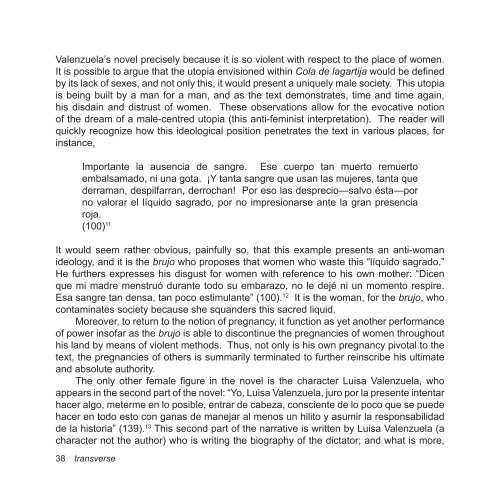Untitled - Centre for Comparative Literature - University of Toronto
Untitled - Centre for Comparative Literature - University of Toronto
Untitled - Centre for Comparative Literature - University of Toronto
You also want an ePaper? Increase the reach of your titles
YUMPU automatically turns print PDFs into web optimized ePapers that Google loves.
Valenzuela’s novel precisely because it is so violent with respect to the place <strong>of</strong> women.<br />
It is possible to argue that the utopia envisioned within Cola de lagartija would be defi ned<br />
by its lack <strong>of</strong> sexes, and not only this, it would present a uniquely male society. This utopia<br />
is being built by a man <strong>for</strong> a man, and as the text demonstrates, time and time again,<br />
his disdain and distrust <strong>of</strong> women. These observations allow <strong>for</strong> the evocative notion<br />
<strong>of</strong> the dream <strong>of</strong> a male-centred utopia (this anti-feminist interpretation). The reader will<br />
quickly recognize how this ideological position penetrates the text in various places, <strong>for</strong><br />
instance,<br />
Importante la ausencia de sangre. Ese cuerpo tan muerto remuerto<br />
embalsamado, ni una gota. ¡Y tanta sangre que usan las mujeres, tanta que<br />
derraman, despilfarran, derrochan! Por eso las desprecio—salvo ésta—por<br />
no valorar el líquido sagrado, por no impresionarse ante la gran presencia<br />
roja.<br />
(100) 11<br />
It would seem rather obvious, painfully so, that this example presents an anti-woman<br />
ideology, and it is the brujo who proposes that women who waste this “líquido sagrado.”<br />
He furthers expresses his disgust <strong>for</strong> women with reference to his own mother: “Dicen<br />
que mi madre menstruó durante todo su embarazo, no le dejé ni un momento respire.<br />
Esa sangre tan densa, tan poco estimulante” (100). 12 It is the woman, <strong>for</strong> the brujo, who<br />
contaminates society because she squanders this sacred liquid.<br />
Moreover, to return to the notion <strong>of</strong> pregnancy, it function as yet another per<strong>for</strong>mance<br />
<strong>of</strong> power ins<strong>of</strong>ar as the brujo is able to discontinue the pregnancies <strong>of</strong> women throughout<br />
his land by means <strong>of</strong> violent methods. Thus, not only is his own pregnancy pivotal to the<br />
text, the pregnancies <strong>of</strong> others is summarily terminated to further reinscribe his ultimate<br />
and absolute authority.<br />
The only other female fi gure in the novel is the character Luisa Valenzuela, who<br />
appears in the second part <strong>of</strong> the novel: “Yo, Luisa Valenzuela, juro por la presente intentar<br />
hacer algo, meterme en lo posible, entrar de cabeza, consciente de lo poco que se puede<br />
hacer en todo esto con ganas de manejar al menos un hilito y asumir la responsabilidad<br />
de la historia” (139). 13 This second part <strong>of</strong> the narrative is written by Luisa Valenzuela (a<br />
character not the author) who is writing the biography <strong>of</strong> the dictator; and what is more,<br />
38 transverse




